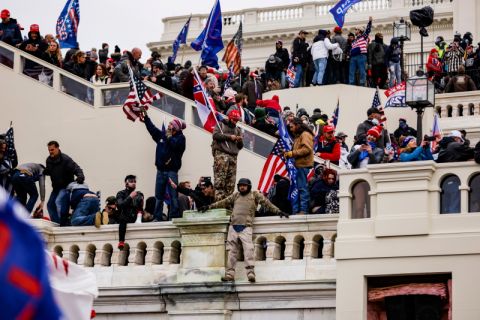
As the eyes of the world were fixed on the violent mob of Trump supporters overtaking the U.S. Capitol building on January 6, Professor Noah Weisbord was analyzing the situation through his keen criminal law lens. Weisbord, who wrote the acclaimed book, The Crime of Aggression: the Quest for Justice in an Age of Drones, Cyberattacks, Insurgents and Autocrats (Princeton University Press, 2019), focuses his research on the role of criminal law in managing, reflecting or exacerbating intergroup conflict.
Set out below, Professor Weisbord presents his examination of the day’s events and the areas he finds important for assessing the future of American politics.
Two days ago, hundreds of Trump supporters stormed the U.S. Capitol following a rally where President Donald Trump repeated false claims of widespread voter fraud. The mob overran security forces and breached the Senate Chamber. Lawmakers taking cover behind chairs were given gas masks and evacuated, temporarily disrupting the certification of the election results.
The meaning Americans place on Wednesday’s events will determine what the future holds. Were these events the last convulsions of Trumpism or is this just the end of the beginning? Is the pendulum of history swinging predictably from right to left, gently moderated by Joe Biden’s victory? Perhaps we are experiencing a paradigmatic shift in politics due to our unprecedented, siloed social media environment. Is Trump the inoculation against the more virulent, unknown, autocrat waiting in the wings?
Once law enforcement finally cleared the Senate floor, when the Senators resumed certifying the vote, a number of Senators reached for historical analogies to situate the day’s events. New Jersey Senator Cory Booker compared the day’s events to the War of 1812, where forces attacking the Capitol were waving the flags of the king, while the recently cleared invaders were waving Trump flags. Colorado Senator Michael Bennet likened the day’s events to the fall of the Roman Republic, with armed gangs marauding through the streets. Many of these speeches were defiant and grandiose, prompting Canadian journalist Tabatha Southey to tweet, “Is there literally nothing that can stop America from self-congratulating for a few minutes?”
Politicians and pundits also sought meaning by looking abroad. According to former President George W. Bush, “This is how election results are disputed in a Banana Republic.” A number of pundits invoked the German putsches of the 1920s, including Hitler’s Beer Hall Putsch, where right-wing gangs repeatedly attempted to overthrow the democratically elected Weimar government. Indeed, there were confederate flags in the Capitol building and one Trump supporter had worn a t-shirt with “Camp Auschwitz” printed on it. “Remember this day forever,” President Trump tweeted, perhaps invoking historical refusals by far-right ideologues, including Hitler and Confederate proponents of the Lost Cause, to admit defeat, even after being conquered and disarmed. Twitter blocked the President’s account for 12 hours and warned that they may suspend him permanently.
In sectarian societies like the U.S., the future is uncertain, the past is hotly contested, and there is no shared present for those marinated in alternative facts. To understand what may happen next, I will be looking at culture first, and politics as a subset. Reactions to the events of January 6 revealed some of the cultural Lego blocks that are likely to constitute the future of U.S. politics. These historical and foreign analogies will be assembled and mobilized in ways that are both familiar and new. The United States is not Weimar Germany, the collapsing Roman Republic, illiberal Venezuela, or authoritarian Turkey. Yet these are the moments and places that are on the minds of decision-makers and influencers, and the patterns they see will guide their choices.
Perhaps most disturbingly, sectarian violence, however clownish, was re-introduced into U.S. national politics to great effect. There is no telling what role sectarian violence is destined to play. In a heavily armed, fearful, deeply divided community, this is the Lego block I am most closely tracking.